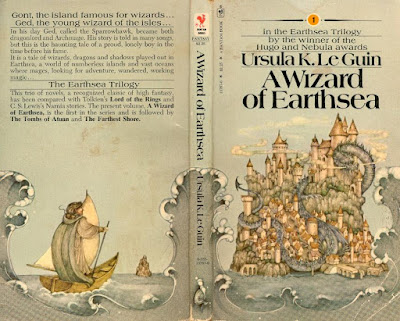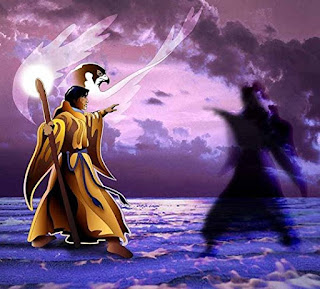Ursula K Le Guin and the Original Magician's School
Luis Alberto Urrea (Mexican-American poet, novelist, and essayist) wrote:
Of all my favorite memories of Ursula, this is in the top ten: she said, “Once you read women, you must write about women. But don’t write about us like men do.” She pointed that pipe at me. “When men write about women, the woman in the story invariably pauses at a mirror and regards herself. And she says, ‘My God, my breasts are magnificent.’ Luisito–we don’t do that!” I actually fell over on her rug laughing. And I never forgot it. SourceLet me introduce you to the author who wrote a magnificent tale about a kid who has almost no family but possesses some great powers, who arrives at a special school for magicians only to discover that he is destined for greatness, but he must face great evil and conquer it. Does this remind you of someone? If you think Harry Potter, you are not wrong. But I’m talking about Ursula K. Le Guin, who passed away this January, and her Earthsea Cycle series. She wrote the first book, A Wizard of Earthsea, in 1968, long before HP came along.
Here’s how The Guardian described that first book.
“Ged, a poor smith’s son, is born with a huge talent that he uses to save his village from invaders, but his gifts make him arrogant and impatient. At wizard school, he makes one friend and one enemy, and in a duel summons a monster that scars him and sends him on a deadly quest across the lonely seas full of peril. With the moral, intellectual and supernatural power to outwit dragons, resist evil, change weather and transform himself into a hawk, he is apparently defenseless against an enemy who increasingly takes on his appearance to trick or kill him. How he defeats his enemy is wholly unexpected, yet completely right because, like all great quests, it involves confronting the dark side of the hero’s nature.” Source
Only in silence the word, only in dark the light, only in dying life.
~ A Wizard of Earthsea
A lot of praises were written for Le Guin’s work and all rightfully shine. She wrote rich, fantastic books for both adults and children. She wrote heavy, powerful Sci-Fi books like The Left Hand of Darkness (1969): A Hugo-winning story of an icebound planet portraying a world in which gender is not fixed, as it is an androgynous race, neither male nor female, but capable of being both (and neither), depending on the lunar cycle. Le Guin said once that the book was an intellectual experiment designed to research the nature of human societies. “I eliminated gender to find out what was left,” she said.
A Wizard of Earthsea is a story, or in fact the first story in the Earthsea Cycle series, which will enchant both children and grownups. The story has a lot of layers, a great literary value, and I even found an echo of the Tolkien world there. The tale has a lot of surprises and some great truths about life that I’m not going to elaborate on, as I don’t wish to ruin the story for you. Ged, our hero, is a great character, he has amazing magical talents, but he is also quite human with faults and flaws.
And on top of everything else, there are also talking dragons in the story! Yay, I love it.
For a word to be spoken, there must be silence. Before, and after.
***
The wise needn’t ask, the fool asks in vain.
The second book in the series, The Tombs of Atuan (1970), is as good as the first. Some say it’s even better, as its hero is a girl. She was taken from home when she was very young, by a religious sect, who intended her to be their reborn high priestess of the Nameless Ones. She grew into her role, taught by the dark priestesses, and became a powerful woman. One day, while walking in the underground tunnels, she encountered an old man with a shining wand. His name was Ged. I’ll not go on, just add that this is a coming-of-age story. It’s an emotional journey for the heroine, a struggle between good and bad; it’s about compassion and looking for the right way to go on.
The Earth is beautiful, and bright, and kindly, but that is not all. The Earth is also terrible, and dark, and cruel. The rabbit shrieks dying in the green meadows. The mountains clench their great hands full of hidden fire. There are sharks in the sea, and there is cruelty in men’s eyes.
The third book, The Farthest Shore (1972), is about a journey. Magic starts to disappear from Earthsea, the world and its wizards are losing their magic, the dragons stop talking. Ged, an Archmage, wizard, and dragonlord, is determined to discover the source of this devastating loss. Ged embarks on a treacherous journey, aided by a young prince, Arren. That journey will test their strength and willpower. To restore magic, the two warriors must venture to the farthest corners of their world—and even beyond, to the realm of death.
I do not care what comes after; I have seen the dragons on the wind of morning.
In 1990, Le Guin published another book in that series, Tehanu, which continues the story of Ged and Tenar (the heroine from the second book). The last book, The Other Wind, was published in 2001. Once again the story deals with death, love, freedom, and the dangers of interference in the natural order of life. I didn’t read the last two.
This is not a fantasy series full of raging battles and invincible odds, but a series about people and how they live day-to-day life, deal with grief, and try to make the right choices when they are presented with obstacles and complications.
Ursula Le Guin is a pioneer in the Sci-Fi world, a woman who wrote fantasy and Sci-Fi in the 60s, 70s, and beyond. In a 2017 interview with LA Review of Books Magazine, she was asked:
Are you
getting weary of being honored and lionized
Her reply:
Always remember, you’re talking to a woman. And for a woman, any literary award, honors, notice of any sort has been an uphill climb. And if she insists upon flouting convention and writing SF and fantasy and indescribable stuff, it’s even harder.
This is only a small fraction of the rich amazing world of Ursula Le Guin, her work and her revolutionary ideas, I hope you enjoyed meeting this special writer/woman and if you already know her work, savor meeting her again.
People who deny the existence of dragons are often eaten by dragons. From within.
~ The Wave in the Mind












constoconbe Matt Wyffels Download crack
ReplyDeletecesrusthealthpper